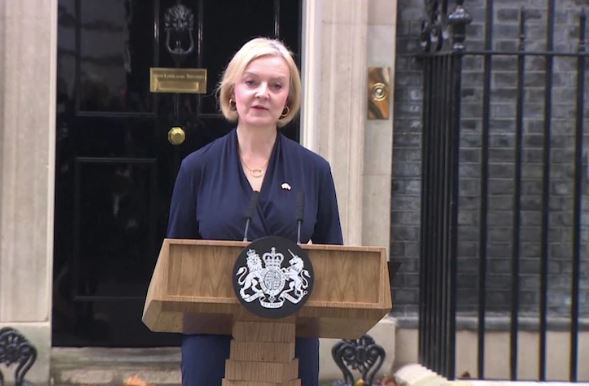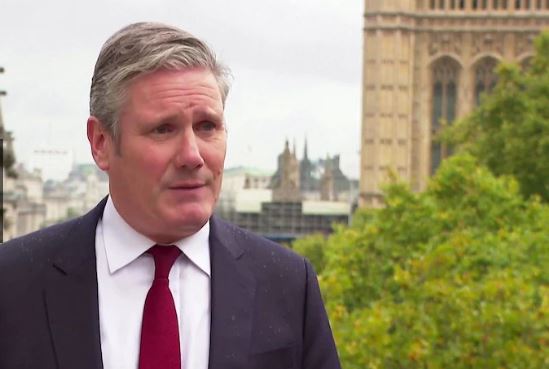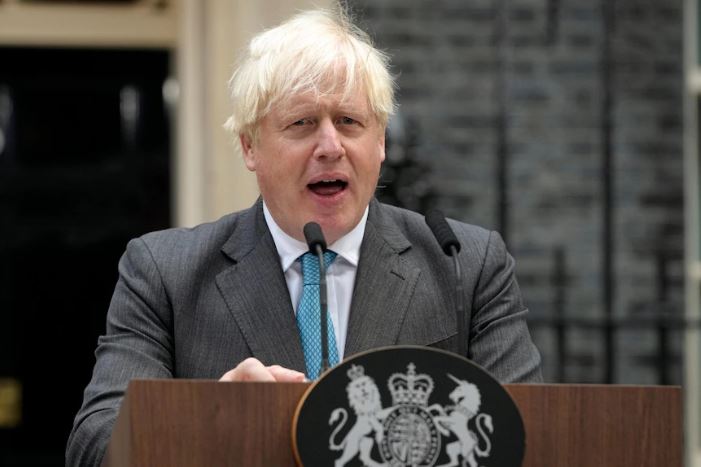Liz Truss will become the shortest-serving prime minister in Britain’s history after bowing to pressure from her own MPs to resign following a disastrous start to her premiership.
It follows weeks of plummeting opinion polls and turmoil in financial markets following her government’s mini-budget at the end of last month.
She will remain as prime minister until a leadership election is completed within the next week to find her replacement, and there’s speculation Boris Johnson is considering a bid to return to the top job.
Speaking outside the door of Number 10 Downing Street, Ms Truss accepted that she could not deliver the promises she made when she was running for Conservative Party leader, having lost the faith of her party.
“I recognise though, given the situation, I cannot deliver the mandate on which I was elected by the Conservative Party. I have therefore spoken to His Majesty the King to notify him that I am resigning as leader of the Conservative Party,” she said.
“This morning I met the chairman of the 1922 Committee, Sir Graham Brady.
“We’ve agreed that there will be a leadership election to be completed within the next week.

“This will ensure that we remain on a path to deliver our fiscal plans and maintain our country’s economic stability and national security.
“I will remain as prime minister until a successor has been chosen.”
Ms Truss, who has been in power for just 45 days, will become the shortest-serving prime minister in Britain’s history – George Canning previously held the record, serving 119 days in 1827 before he died.
Earlier on Friday, party officials had gathered at Downing Street while a growing number of her own MPs called on her to quit.
Appointed by Queen Elizabeth II on September 6, Ms Truss was forced to sack her chancellor and closest political ally, Kwasi Kwarteng, last week and abandon almost all of her economic program after their plans for vast unfunded tax cuts crashed the pound and British bonds.
Approval ratings for her and her Conservative Party collapsed.
On Wednesday she lost the second of the government’s four most senior ministers, when Home Secretary Suella Braverman resigned over a minor breach of the ministerial code.
In her resignation letter, Ms Braverman, 42, took a thinly veiled swipe at Ms Truss’s government, saying she had “serious concerns” about the government’s ability to honour commitments it made to voters at the last election.
“Not only have we broken key pledges that were promised to our voters, but I have had serious concerns about this government’s commitment to honouring manifesto commitments, such as reducing overall migration numbers and stopping illegal migration, particularly the dangerous small boats crossings,” she wrote.
“It has been a great honour to serve at the Home Office.
“In even the brief time that I have been here, it has been very clear that there is much to do, in terms of delivering on the priorities of the British people.”

Ms Truss had also faced laughter as she tried to defend her record to parliament and saw Conservative MPs openly quarrel over policy, deepening the sense of chaos at Westminster.
New Chancellor of the Exchequer Jeremy Hunt is now racing to find tens of billions of pounds of spending cuts to try to reassure investors and rebuild Britain’s fiscal reputation as the economy heads into recession and with inflation at a 40-year high.
Opposition Leader Sir Keir Starmer said the situation was “a mess” and called for a general election.
“This is not just a soap opera at the top of the Tory party — it’s doing huge damage to our economy and to the reputation of our country,” the Labour leader said.
“And the public are paying with higher prices, with higher mortgages.
“So we can’t have a revolving door of chaos, we can’t have another experiment at the top of the Tory party.”
Race now on to replace Truss

A new leadership election will be completed by next Friday, October 28, with Conservative MPs having until 2pm on Monday, UK time, to nominate candidates.
Candidates will need at least 100 nominations, which will mean likely only three will make the cut, given there are 359 Conservative MPs sitting in the House of Commons.
If enough MPs get behind one candidate, it could knock out all other contenders before a ballot is even held and they would automatically become party leader and prime minister.
However, if there are two candidates left, they will then take part in hustings before an online vote for members of the Conservative Party.
“We fixed a high threshold but a threshold that should be achievable by any serious candidate who has a prospect of going through,” Sir Graham Brady said.
Those expected to run include Penny Mordaunt and former chancellor Rishi Sunak.
Mr Hunt has ruled himself out, and The Times newspaper reported former prime minister Boris Johnson, who Ms Truss replaced, may throw his hat in the ring.
A poll earlier this week showed that most members wanted Mr Johnson — who was ousted from Downing Street in July after a series of scandals — to return.
Mr Johnson — who is still facing an investigation into whether he misled parliament after he and his staff held a string of parties during COVID-19 lockdowns — is believed to cutting his holiday in the Caribbean short to return to the UK this weekend.
The face of the 2016 Brexit vote has loomed large over politics since he became London Mayor in 2008. He led his party to a landslide election victory in 2019 but was driven out of office in July.
Several Conservative MPs have voiced their support for the former prime minister.
“I hope you enjoyed your holiday boss. Time to come back,” James Duddridge said.
Source: ABC News

